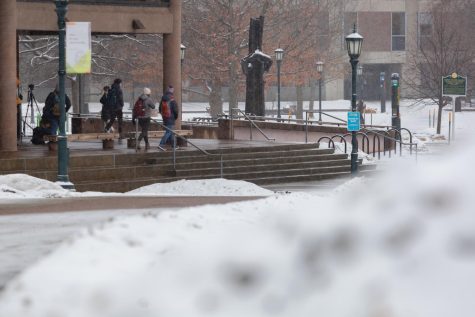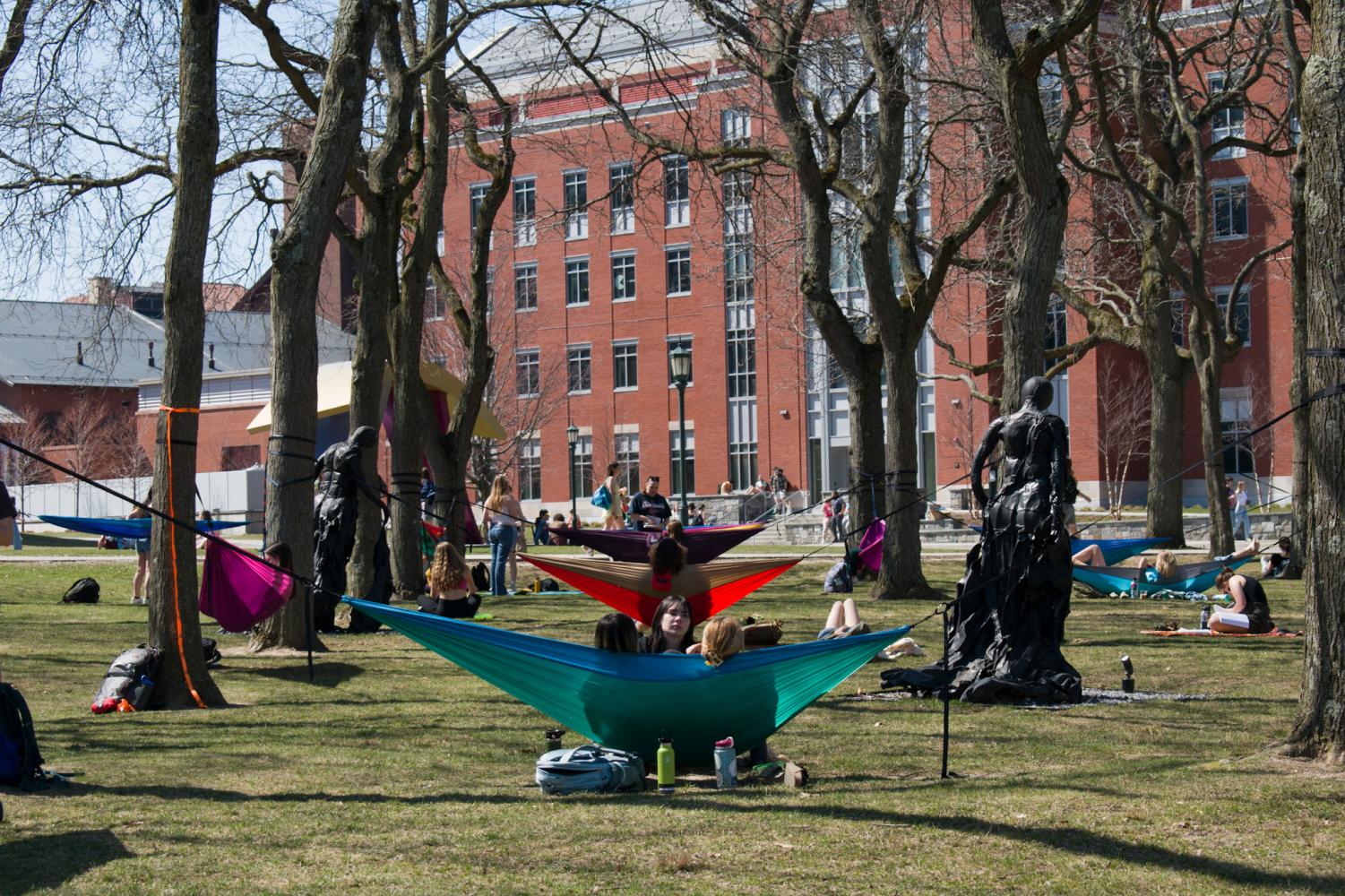Here Comes The Sun: UVM weather and students’ mental health
April 20, 2023
In the past week, there has been a change across campus that has not gone unnoticed by students at UVM: the weather.
“I think [the recent change in weather in Burlington] came at a very much needed time for everyone here at the school,” said first-year Carmela Symula. “Most people I know struggled through the winter and really needed that extra boost of serotonin.”
The transition from cold, cloudy days on campus to warm days imitating summer has had noticeably positive effects on the lives and mental health of students.
At UVM, students live through winter for at least four months out of the school year. With a majority of students coming from out of state, this lifestyle is new to many.
First-year Chaney Szeto was born and raised ten minutes from the beach in Southern California. Szeto grew up skiing, so the cold is nothing new. However, she had to adapt to living through the intense seasons that come with living in Vermont.
“Living in the cold for a long period of time is something new to me and it’s certainly brought on new experiences,” Szeto said. “The several winter blizzards here definitely affected how I felt about living through winter, and brought on some negatives which I’ve never experienced before.”

Due to the severity of the cold in Vermont, many students, including Szeto, experienced the adverse effects of the winter season.
“This was the first year I experienced seasonal depression because it is the first year I’ve experienced all four seasons while living somewhere,” Szeto said. “Cloudy after cloudy days really got to my head and I felt like the days were just repeating over and over. It honestly felt like I didn’t have anything new to look forward to.”
First-year Sebastián Cataldi is from Carolina, Puerto Rico. Being from another place where it is always sunny, the transition to Vermont affected his mental health in similar ways to Szeto.
“I didn’t like the cold weather because of the negative impact it had on my mental health,” Cataldi said. “It was unfamiliar and uncomfortable.”
Although the effects of the cold weather were new to Szeto and Cataldi this year, the trend of the cold weather affecting people’s mental health is not new in the psychological world.
Jennifer Hughes Phillips, associate director of Counseling and Psychiatry Services and a licensed clinical social worker, addressed the impact of the cold weather on students’ mental health, in an April 11 email to the Cynic.
“The weather may have an impact on students’ wellbeing particularly by lowering mood when it is cloudy, dark, gray, dreary, cold, etc.,” Phillips stated in the email. “The extent of the impact of the weather on students’ mood may vary, but we do see moods shift and improve as there is more daylight, warmer temperatures and the sun makes an appearance for more extended periods of time.”
In the last decades, several studies were conducted which show the association between vitamin D and brain health and the impact of vitamin D deficiency on the brain. The results showed many positive effects of vitamin D on the brain, such as antioxidant and anti-inflammatory properties and helping to fight against Alzheimer’s disease, according to a July 10, 2018 Cureus article.
However, winter sunlight does not have enough of the UVB component that is essential for vitamin D synthesis. For all practical purposes, one cannot make vitamin D in cold climates in winter, according to a Dec. 6, 2022 New York Times article.
However, with the transition to warm weather come opportunities to manage sadness and depression.
“Just knowing what’s coming helps me get through the winters here,” Symula said. “It’s knowing that summer and spring are right around the corner, and that it’s going to be beautiful outside.”
Little solutions such as reading, skiing with friends or crocheting have also helped her combat the negative feelings she encountered during the winter season, Szeto said.
Developing healthy lifestyle patterns—like nourishing and moving your body, connecting socially, and seeking support—help combat altered moods caused by the colder seasons, Phillips stated.
“This is easier to do when you are feeling more stable in your mood and have less stress,” Phillips stated. “So developing healthy patterns when things are going well will allow you to lean on the routines you already have established when things are feeling hard.”
With the newfound sunshine and warm weather, students are taking the opportunity to spend more time outside.

“Here, when it’s warm, literally everyone is outside,” Szeto said. “We just know that the sunshine doesn’t come very often, so when it does, we have to definitely take advantage of that and appreciate it more.”
With the warm weather moving more people outside, students noticed a social shift around campus as well.
“You walk around campus and you see everyone up hammocking, playing games and just laying on their blankets and talking,” Symula said. “Then you start talking to people—it just makes the world feel more alive.”
Szeto has also noticed an increase in social connections outside now that the weather has gotten warmer.
“For example, I played volleyball outside with my friend yesterday, and that was very enjoyable,” Szeto said. “Random strangers joined in and played with us which was fun, and it was definitely more social interaction.”
As the year progresses, summer will emerge and warm weather will finally shape into the seasonal norm. The outdoors will likely be filled with people conversing with each other, enjoying their daily dose of vitamin D.
“The beauty of a sunny day and warm weather is not just the fact that it’s sunny,” Cataldi said. “It’s the fact that people can fill that space of being outside together.”
